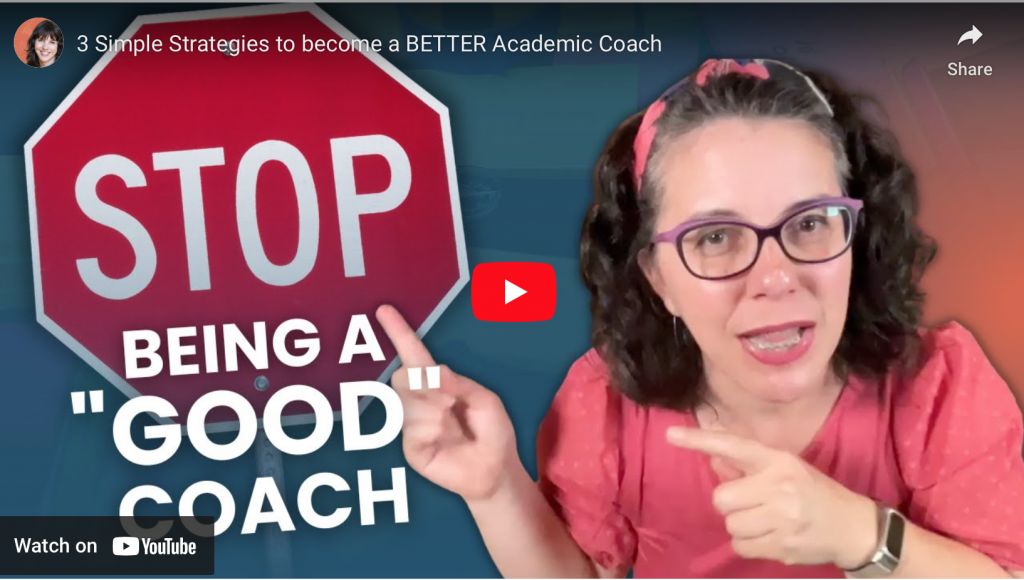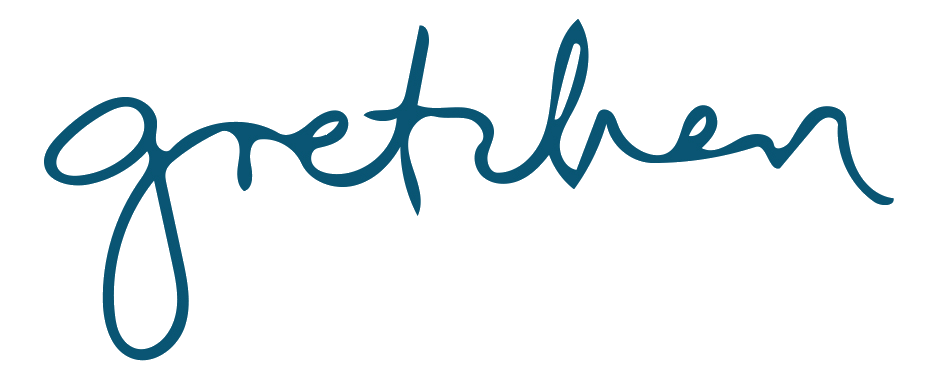What’s the difference between a good academic coach and a GREAT academic coach? Whether you’re a coach, teacher, counselor, therapist, parent, or anyone who works with students, we ALL want to reach students more effectively, right?
What if I told you there are a few simple strategies you can use to engage your students like never before? In today’s video, I’ll unpack three strategies that encourage retention, action, and impact.
From more doing and less talking to modeling and noticing, I encourage you to watch this video and identify what you’re already doing well and think of how you can apply one of these strategies to change how you work with students.
Click the image below to watch the video … or simply read on for the transcript.

What’s the difference between a good academic coach and a great academic coach? That’s what we’re going to talk about in this video and specifically, three skills that are easy to practice that will take you from good to great in your work with students. Let’s dig in!
First of all, let’s talk about what I mean by academic coach. Do I actually mean that the tips I’m about to provide help you be better at working one-to-one with students on their study skills and time management and organization? Yes, I do mean that. But I also consider any educator has potential to be an academic coach, if you get good at these three skills we’re going to talk about. This could be classroom teachers, school counselors, parents…this could be you, if you have even a little suspicion that just teaching, just telling students, isn’t quite working to help them build their academic confidence and competence, then I invite you to take on these three skills and just consider yourself an academic coach in the making.
Next, I want to show you this little infinity loop, because there are two specific actions that really good coaches know how to move between. The first one is, we need to get good at doing things, in our own lives and also alongside students. So the “doing of things” is part of good teaching and coaching. But what takes you from good to great is if you do the second thing, and that is, you notice what it was like to do the thing you just did. We do something, then we notice about it; we do something and then we notice about it. What I find is that most educators either do a lot of doing without a lot of noticing…or vice versa, especially people who’ve been trained as life coaches for students, do a lot of noticing, but not a lot of doing. Really good teaching and coaching is in the infinity space between these two actions–so we’re gonna’ use this as a lens to talk about the three skills, or rules, I think take someone from being a good coach to a great coach, no matter what kind of educator you are.
3 Simple Strategies to become a BETTER Academic Coach
- Don’t teach a habit or skill you haven’t tried yourself. It is a huge piece of my training for educators that you don’t just learn about how a student can study, take notes, manage time, but you practice all the tools in your own life. So that’s the Do: you do try out academic skills, and you notice what they’re like for you. That’s why I want you trying them out, because students can smell inauthenticity, right? So when you are trying on a skill in your own life, that is the doing piece, and then you get to notice about it. Notice, “did I like that thing? That note-taking thing? Did I like honing my notes or did I have resistance to doing that thing? Did I still procrastinate the way students do?”
I find a lot of educators actually do a lot of teaching without actually doing the things that they’ve assigned. How many teachers have actually written the essay they’re assigning students to write? So I think this is really important, the more you can do the infinity loop between doing and noticing the skills that you teach, the more you have empathy for what it’s actually like to follow the directions in the first place. That empathy goes a long way for students, because, remember, they can smell inauthenticity–which means they also really respect and respond to authenticity, which includes real world stories about you having tried on in your own body, in your own mind, the tools that you’re teaching. - Don’t teach students too much. Something I’ve noticed amongst educators who join my program is they get really excited about all of the brain science that I teach them to teach students, and then they just want to share all of it with students. But there’s not a faster way to turn off a student’s willingness to pay attention than overfilling them past their capacity to take in information. So the Do, which is something we practice a lot in my Anti-Boring ed workshops and training calls, is to practice teaching the least students need to know. I’m constantly cutting. What else don’t they need to know, so they take action on the thing that’s most important? I find many educators need to build their muscle on this figuring out what’s the least a student needs to know that’s going to contribute to their lives.
Again, the practice of teaching the least a student needs to know moves in this infinity circle, because you teach a little something to the student–that’s the doing–then you notice, how did that land? Did it overwhelm the student? If so what could I cut out with my next client or with my next group of students? What might I teach less of, in order to get them to really do more? So it’s this beautiful, beautiful loop of the Lifelong Learner, right? To do and notice. We want to model that in our own practices, so students can learn this infinity loop by osmosis. - Don’t simply teach or coach students. Remember, we’re trying to help students integrate these habits into their systems for the rest of their lives. In order to do that, it is a truly highly advanced academic coaching skill to make the mechanisms of teaching and learning visible to students. So what this looks like in one-to-one coaching for me, is I often towards the end of a session, say, “Hey, what was valuable? What did I do today that was helpful for you?” And the student will answer. Then I’ll say, “Oh, great, how could you do that for yourself now, because it’s not about me being a great coach for you, and then making you dependent on me. Instead, it’s actually about you noticing, how I model excellent teaching and learning. And you can become a better teacher to yourself and a better learner, if we unpack what I’m doing, and help translate it to you.”
This takes some fine-tuning, the skill of learning how to pause, in the moment when you are teaching, how not just to teach a skill or how not just to coach a student through creating a time management plan for the week, but how to help them notice what’s working and what’s not. “What am I doing that they can start doing? What do they still need me to do? Because they’re not quite ready to take it on, which is okay, because we learn in increments.” So it’s a skill to practice that pause, and to learn how to make visible the mechanisms of good teaching and learning. But here’s the key: make it visible without teaching too much! Little 30-second breaks or two-minute reflections is all it really takes. But it’s a muscle. It’s a muscle of moving through the two sides of the infinity loop.
Are you an educator who actually would like to get good at these sorts of things?
Then I have a suggestion for you. Let me model these skills for you. In my own materials, I have a free way for you to catch a glimpse of how I take the least you need to know around study skills and then model it for students and educators. You’ll find that here–that’s where I would start if I were you.
And there’s always the opportunity to join us inside my Anti-Boring Educators Club, where, together during really fun community calls, we get to practice all these skills alongside each other and model them for each other. It’s a rich and exciting learning experience. But maybe your first step could be to just go grab that free tool and see what you can learn from that.
If there was anything of value here, tell me below what your biggest takeaway is. Or maybe tell me which one of these skills you’d like to work on. I’d really appreciate it!
Take care, and I’ll see you in the next video.

